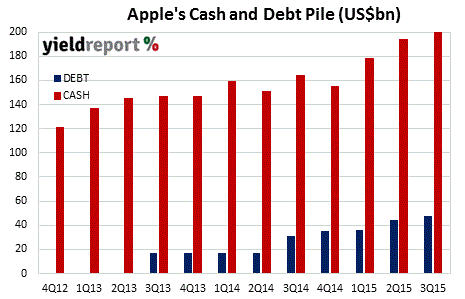Apple is the most or one of the most profitable companies in the world. It has a hoard of cash around the globe, which when totalled up exceeds US$200bn. In a teleconference held for Australian bond fund managers, that is seen as a prelude to Apple issuing $AUD domestic bonds, Apple reiterated that the major reason for keeping its cash outside the US is that any cash repatriated will incur tax at a corporate rate of 35%. Apple’s totally legal solution to this is to keep the money offshore and to borrow money (via the bond market) that it then uses to fund share buy-backs and dividend payments. The interest it pays on the debt is tax deductable to Apple and shareholders are kept happy. Apple has accumulated more cash than any company in history and an amount that is larger than the GDP of many nations.

Originally Apple’s borrowings occurred in the US but increasingly it has sought to diversify its debt investor base to Europe, Japan and now possibly Australia. A domestic Apple bond would be a huge fillip for Australian fixed interest investors that have a difficult time finding similarly rated investments that are not banks. Apple is currently rated AA+ by S&P.
One side benefit of borrowing in the country where a company has a lot of cash is the loan acts as a natural currency hedge. When the value of the asset rises or falls so does the value of the liability. The asset in this case is the cash while a new Apple bond issued in Australian dollars would be the liability.
Read more:
Nissan Australia roadshow
Apple eyes Aussie bond market

